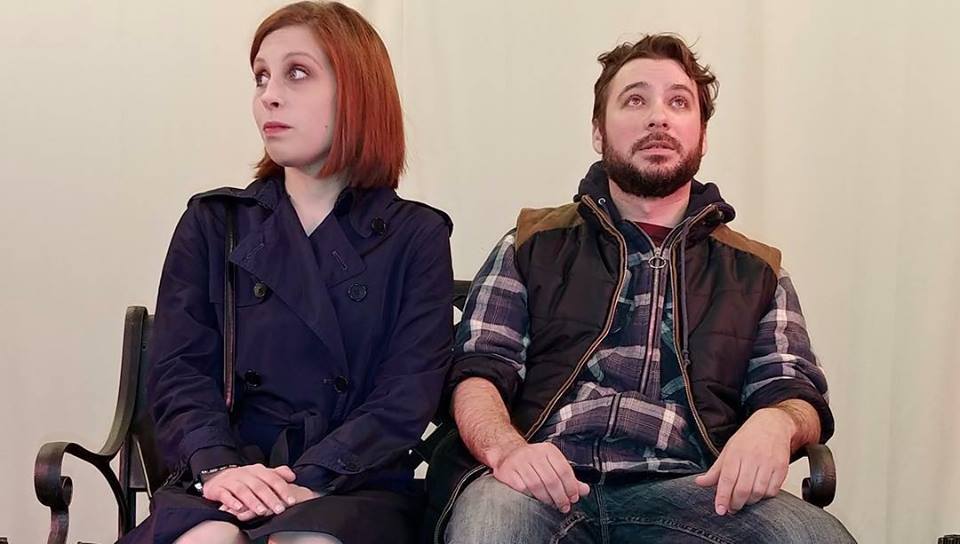|
It’s a Two-Person Romance It’s an intimate, little space at the Irish Cultural Heritage Center. In a rear entrance far from a torn-up stretch of Wisconsin Avenue rests a cozy, little studio space. There’s a bar with a few beers on top at the back of the improvised studio. Folding chairs rest in front of a small stage for two: Becky Cofta and Nate Press. The play is The Good Father. The company is Milwaukee Irish Arts. Cofta and Press are playing Jane and Tim: an Irish couple who meet at a New Year’s Eve party somewhere in the early 2000s. Over the course of a couple of hours, they flutteringly fall in and out of love in a very earthbound romance that’s occasionally emotionally exhilarating. It’s Tightly-Written Two actors. Two characters. Two hours. (There's an intermission.) The drama plays out over the course of a year in their lives. We never see the two characters with others. Just two people. (There’s also an implied dog. There’s also a pregnancy.) To say too much more would be giving away too much. Playwright Christian O’Reilly renders a drama that feels remarkably vivid complexity that gradually sneaks its way into the script. On the surface, it’s just two people in a series of isolated moments over the course of a single year, but things quickly get complicated beneath the surface the way things often do between two people when serious emotions are at work. It’s About Romance Out of Youth’s Reach All too often romance is something that we see onstage or onscreen as breathed through youth. Here we have a couple of characters in their 30s falling for each other between two New Year’s Eves. As the play opens, Becky Cofta plays a woman just out of range of a group of friends who are all becoming parents. She’s never had a kid. Events in life have set her adrift and she’s feeling lost. On the surface, though, she’s very much in control, even while intoxicated she has a sense of mastery over the situation which masks the chaos within. There’s a strong cultural component here. Modern women are expected to be completely together on every possible level. They need to be independent and resilient while emotionally connected and vulnerable. Cofta is heartbreakingly compelling as a woman desperately trying to hold every last dichotomy together with the increasingly ominous complexity of motherhood on the horizon. Cofta is as good in silence as she is in dialogue, rendering a captivatingly complex character. Wordless responses play across her face in a brilliantly natural little micro-choreography. It's quite difficult not to get drawn-in even when she's silent. As an audience we see in Jane what Tim sees in her. Cofta does an excellent job of delivering her end of the attraction to the romance. It’s About Fatherhood, Too A lot has been made of toxic masculinity of late. A culture of men aggressing other men into being aggressive has been handed down from generation to generation. There’s a certain isolation that plays a role in that. Here we have a story about a man who truly wants to be a father. No isolation here--he’s looking for connection. He's looking to break the cycle. His father was distant. There's some suggestion that he might have been physically abusive, too. He’s looking to be the father he never had. This becomes heartbreakingly touching when the all-too-rare subject of male factor infertility sneaks into the narrative. Press delivers a truly complicated character to the stage in flips and convolutions as his resolve is tested in the course of one hour that is one year. There character navigates some very tight emotional turns in the course of the play...sometimes in the span of a single dialogue. There’s one moment near the end of the play that requires Press to dive from wisdom to wounded to angry to apology...all within the span of a single brief monologue. Far from the extremes of flat affectlessness or exaggerated, over-rendered emotion, Press manages to bring every shade of emotion into that moment with just the right emphasis to make it all strikingly vivid. It’s Sad, but It’s Not Sad After the show, my wife actually felt as though she wanted it to have a sadder ending. O’Reilly’s drama is cleverly crafted and perfectly balanced, though. In conversation after the show, it occurred to me that a sadder ending would have come across as being unearned. This drama gets precisely the ending it deserves. There’s nothing that happens here that isn’t fully earned in the course of the script. Nothing comes out of nowhere...not even thee love at the center of it all and THAT is really difficult to pull of in a two-person drama. The success here has every bit as much to do with the script as it does with Press and Cofta, who do an admirable job of giving themselves to a thoroughly engrossing couple of hours in an intimate space. It’s Free (Did I mention it’s free?) Donations are accepted, but this is a free show. Milwaukee Irish Arts performs it a few more times from the intimacy of the Irish Cultural Heritage Center before taking the show to the Acting Irish International Theatre Festival later-on this month in Calgary, Canada. With a drama this good on a free show, there’s no reason not to be a part of the intimacy this weekend. There’s no reason for there NOT to be a packed house every night. Go have a pint and a few tears with a couple of great actors falling in love. It’s a grand time. Milwaukee Irish Arts’ staging of The Good Father runs through May 14 at the Irish Cultural Heritage Center on 2133 W. Wisconsin Ave. Admission is “pay what you can.” For more information, visit Milwaukee Irish Arts onlinemilirisharts.wordpress.com/.
0 Comments
Leave a Reply. |
Russ BickerstaffArchives
July 2024
Categories |

 RSS Feed
RSS Feed
